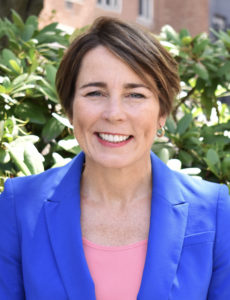Who is a member?
Our members are the local governments of Massachusetts and their elected and appointed leadership.

Gov.-elect Maura Healey
Just two weeks after her inauguration as the 73rd governor of Massachusetts, Maura Healey will address local officials from across the state during the Opening Session of the MMA Annual Meeting & Trade Show on Jan. 20 in Boston.
On Nov. 8, Healey became the first woman and first openly gay elected governor in state history, after serving two four-year terms as the state’s attorney general. She will highlight her policy priorities for the coming year, particularly those of importance to municipalities.
Healey has been a frequent speaker at MMA Annual Meetings during her tenure as attorney general. In 2016, as the keynote speaker at the Women Elected Municipal Officials Leadership Luncheon, held during the Annual Meeting, she reflected on her experiences growing up as the oldest of five brothers and sisters with parents involved in local government, in Hampton Falls, New Hampshire.
“I am somebody who fundamentally believes that all politics is local,” she said, “and the engagement that we have with one another at that level is so fundamentally critical to the health and well-being of families and communities in our state and in fact across this country. I really respect and have the highest regard for the work you do, the time you put in. It is not easy.”
Healey came to Massachusetts to attend Harvard College, where she majored in government, was co-captain of the women’s basketball team, and graduated with honors in 1992. After graduation, she spent two years playing professional basketball as a starting point guard in Europe before returning to earn her law degree at Northeastern University School of Law.
Healey began her legal career as a clerk in the U.S. District Court for the District of Massachusetts, followed by more than seven years in private practice at Wilmer Cutler Pickering Hale and Dorr. She also served as a special assistant district attorney in Middlesex County.
In 2007, she was hired by her predecessor as attorney general, Martha Coakley, as chief of the Civil Rights Division, where she spearheaded the state’s challenge to the federal Defense of Marriage Act. Under Coakley, she also served as chief of the Public Protection and Advocacy Bureau and chief of the Business and Labor Bureau. She resigned in 2013 to run for attorney general in 2014, winning her first campaign for elected office. She was reelected in 2018.
At the MMA conference in 2016, she said the top priority of her office was combating the heroin and opioid crisis that had hit communities across Massachusetts.
“We are with you in this fight,” she said.
She was a leader among attorneys general across the country in winning a 2021 resolution with three opioid distributors that will provide up to $537 million in “abatement funds” to the Commonwealth and its cities and towns over 18 years to fund prevention, harm reduction, treatment and recovery efforts across Massachusetts. In 2020, she worked with the Legislature to create a trust fund to dedicate resources to these efforts.
Addressing another emerging crisis, in May Healey announced that she is suing 13 manufacturers of PFAS — highly toxic “forever” chemicals — used in firefighting foam for contaminating drinking water sources, groundwater and other natural resources, posing a serious threat to public health and the environment. Her complaint alleges the manufacturers repeatedly violated state and federal laws protecting drinking water and prohibiting consumer deception.
“For decades, these manufacturers knew about the serious risks … yet they did nothing about it,” Healey said. “As a result of this deception, our municipalities are spending millions of dollars to provide safe drinking water to their residents.”
Early in her tenure as attorney general, Healey launched the Community Engagement Division, which brings lawyers and mediators from her office into communities for what she called “action hours,” or open forums for handling consumer issues on the spot. Her office also overhauled, and then frequently updated, guidance regarding the state’s open meeting law — particularly when the rules were adjusted during the COVID-19 pandemic.
She also engaged local officials in her campaign to raise awareness about human trafficking, creating a training video and digital toolkit, as well as a webinar for municipal officials and employees, to help people identify signs of labor trafficking and generate referrals to her office for potential investigation and prosecution.
As attorney general, Healey has also prioritized racial equity and civil rights, gun violence, consumer protection, climate change, access to health care, and reproductive freedom.
While Healey was the first woman elected to serve as governor of Massachusetts, Jane Swift served as acting governor from 2001 to 2003 after Paul Cellucci resigned to become the U.S. ambassador to Canada.